Module 11 Body language Unit 3 Language in use 课件(33张PPT,无音频)
文档属性
| 名称 | Module 11 Body language Unit 3 Language in use 课件(33张PPT,无音频) | 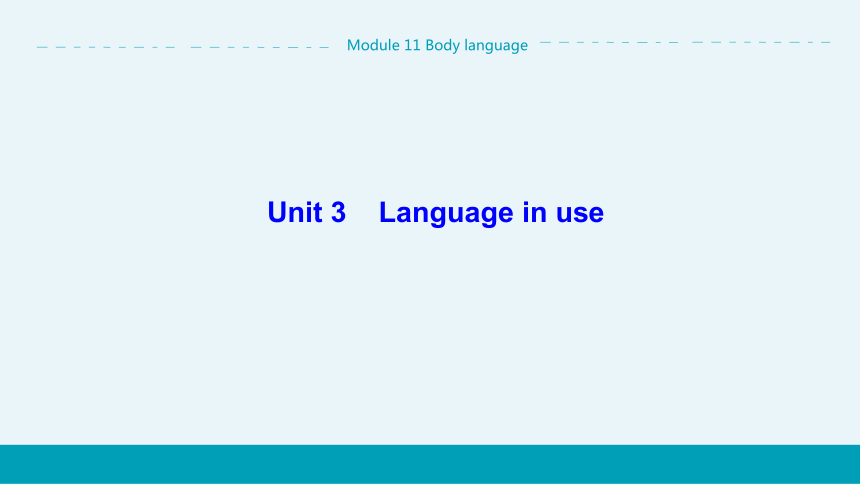 | |
| 格式 | zip | ||
| 文件大小 | 994.6KB | ||
| 资源类型 | 教案 | ||
| 版本资源 | 外研版 | ||
| 科目 | 英语 | ||
| 更新时间 | 2020-04-12 10:26:18 | ||
图片预览

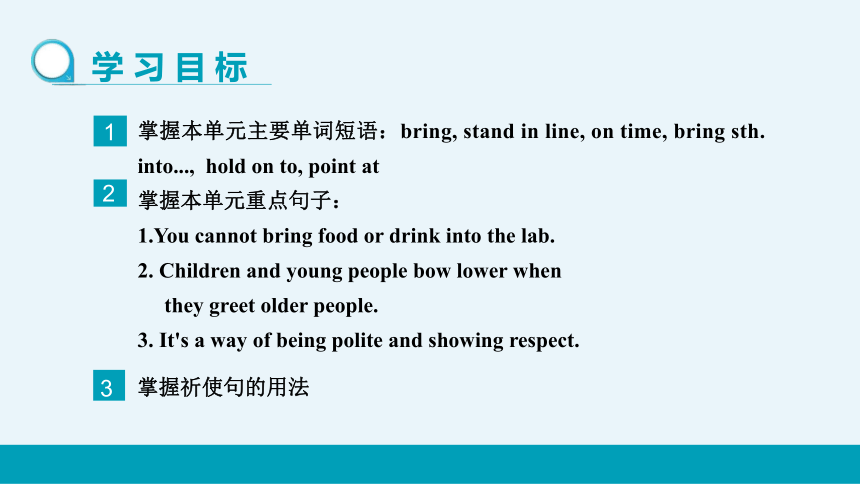

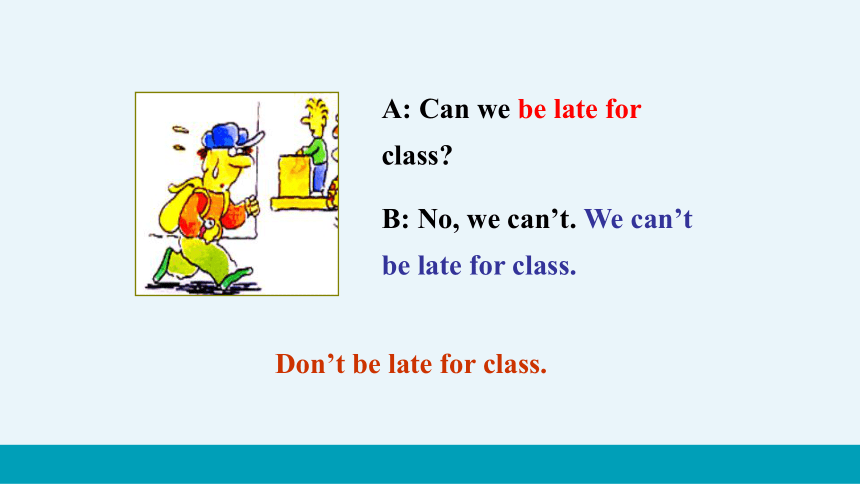
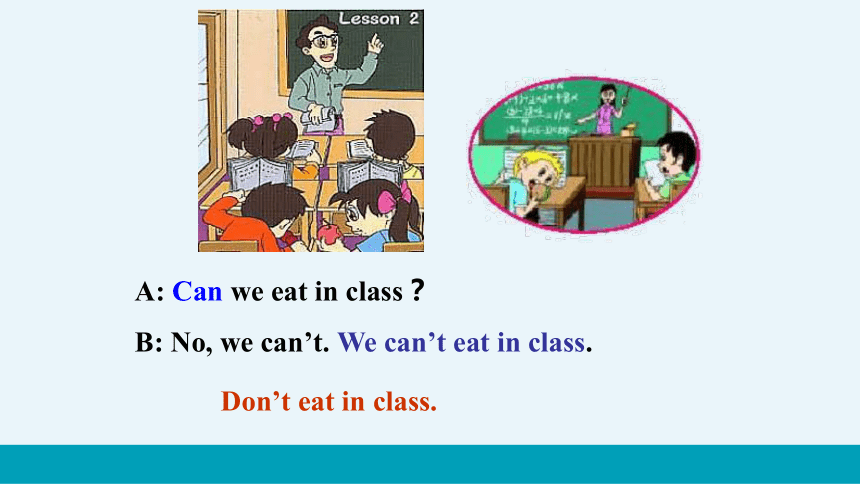
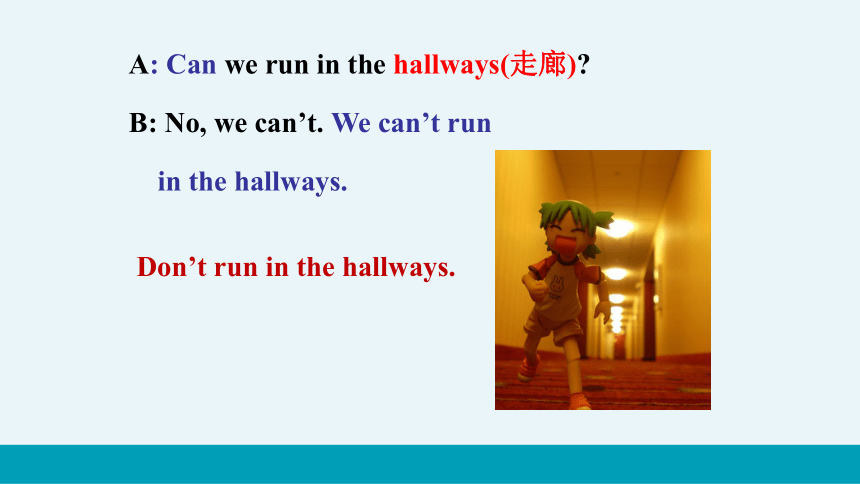
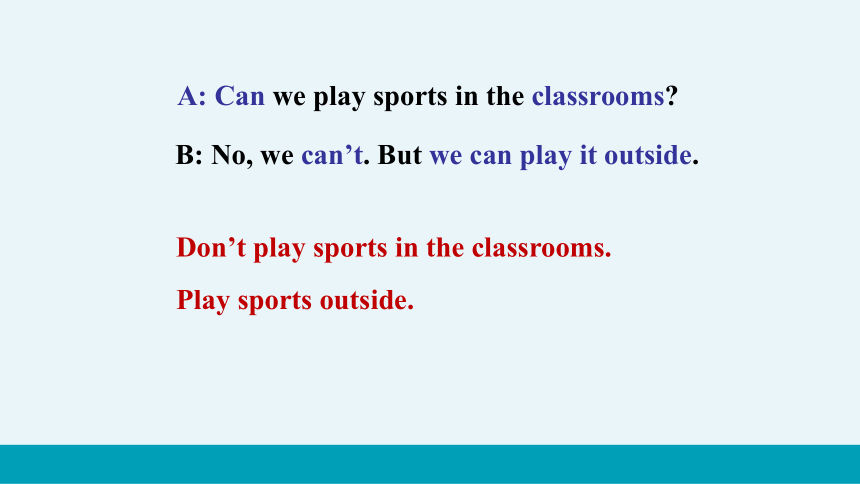

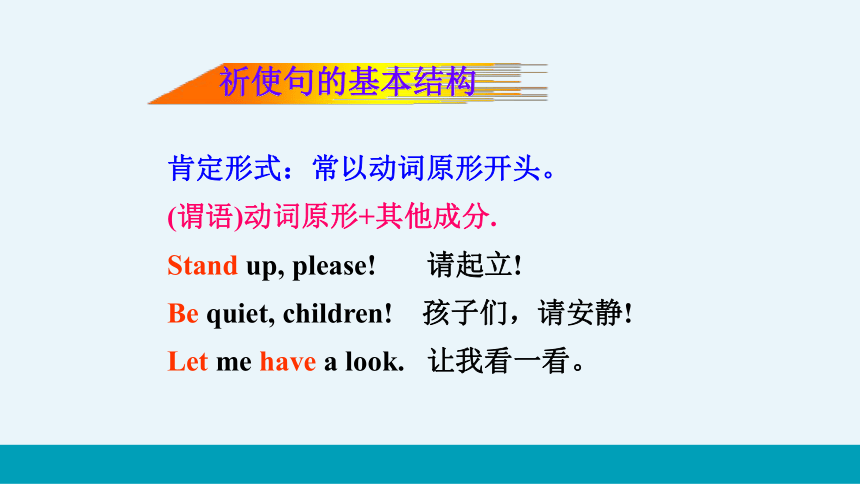
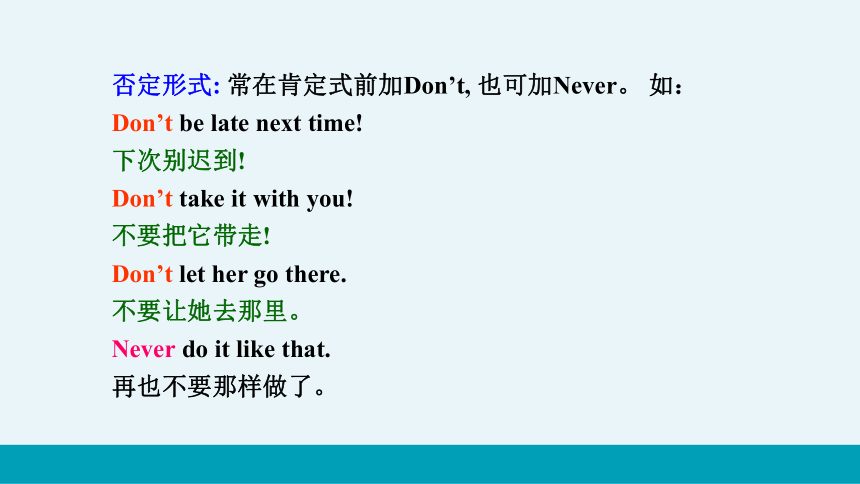

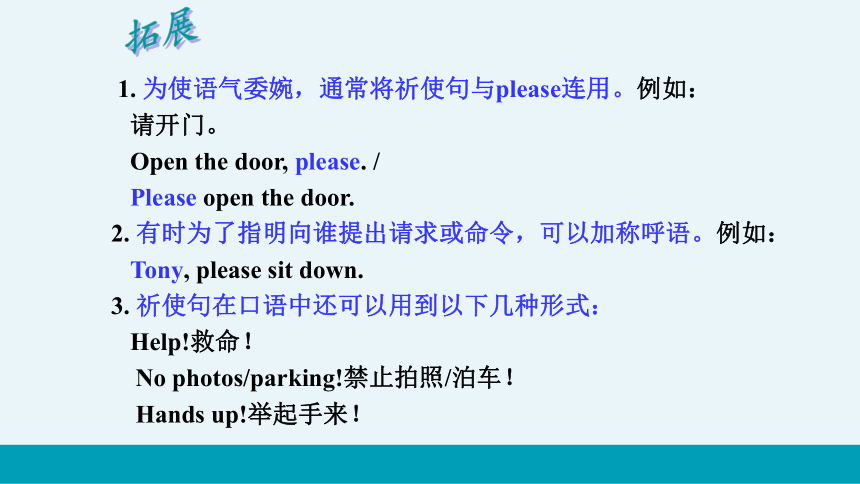
文档简介
课件33张PPT。 Unit 3 Language in useModule 11 Body language掌握本单元主要单词短语:bring, stand in line, on time, bring sth. into..., hold on to, point at
掌握本单元重点句子:
1.You cannot bring food or drink into the lab.
2. Children and young people bow lower when
they greet older people.
3. It's a way of being polite and showing respect.
What can we do at school?
What can’t we do at school?DiscussionA: Can we be late for class?
B: No, we can’t. We can’t be late for class.Don’t be late for class.Don’t eat in class.A: Can we eat in class?B: No, we can’t. We can’t eat in class..A: Can we run in the hallways(走廊)?
B: No, we can’t. We can’t run
in the hallways.Don’t run in the hallways. A: Can we play sports in the classrooms? B: No, we can’t. But we can play it outside.Don’t play sports in the classrooms.Play sports outside.Grammar 祈使句是用来表达请求、命令、劝告、叮嘱、希望或禁止等语气的句子。
祈使句的主语通常为第二人称 you,且常省略。一般没有时态和语态的变化,句末用句号或感叹号,读时用降调。 祈使句 肯定形式:常以动词原形开头。
(谓语)动词原形+其他成分.
Stand up, please! 请起立!
Be quiet, children! 孩子们,请安静!
Let me have a look. 让我看一看。否定形式: 常在肯定式前加Don’t, 也可加Never。 如:
Don’t be late next time!
下次别迟到!
Don’t take it with you!
不要把它带走!
Don’t let her go there.
不要让她去那里。
Never do it like that.
再也不要那样做了。由Let引导的句子多是祈使句,即:
“Let+宾语+动词原形+其他”
→否定形式:
“Don’t+let+宾语+动词原形 +其他”
或“Let+宾语+not+动词原形+其他”不要让他去那里。
Let him not go there.
Don’t let him go there.拓展 1. 为使语气委婉,通常将祈使句与please连用。例如:
请开门。
Open the door, please. /
Please open the door.
2. 有时为了指明向谁提出请求或命令,可以加称呼语。例如:
Tony, please sit down.
3. 祈使句在口语中还可以用到以下几种形式:
Help!救命! No photos/parking!禁止拍照/泊车! Hands up!举起手来!祈使句表示要求、建议对方“将来”做或不做某事,因此其肯定应答语通常用I/we will。否定答语通常用 I/we won’t。如:
--- Knock on the door before you go in!
进去之前要敲门!
--- I will. 是的,我会的。
--- Don’t forget to turn off the lights when you leave.
离开时别忘记关灯。
--- I won’t. 不会忘记的。 口 诀
下面的口诀总结了祈使句的一般规律。一起来看看吧!
祈使句,有特点,
动词原形摆在前,
否定句式也不难,
Don’t 放在最前面,
其他一律都不变。 Language practiceGive them more personal space.
Wave to say goodbye.
Be careful!
Don’t stand too close to North Americans.1 Work in pairs. Talk about do’s and don’ts in a foreign country.1 Work in pairs. Talk about do’s and don’ts in a foreign country.2 Make a list of do's and don'ts to help visitors to Britain.Stand in line.
Don’t touch people when you talk to them.
…Do’s:
Do shake hands when you meet a friend.
Do stand in line.
Do expect rain.
Please talk about the weather.
Do Say “please” and “thank you”.
Do look at people when you talk
Don’ts:
Don’t touch people.
Don’t ask people personal question.
Don’t ask women’s age.
Don’t talk with food in your mouth.
Don’t be late.
3 Rewrite the sentences.It’s important to listen to the teacher.
Listen to the teacher.
You cannot shout in the classroom.
Don’t shout in the classroom.
1. It’s important to be careful.
2. It’s important to clean and tidy the lab.
3. You cannot touch anything if the teacher doesn’t ask you to.
4. You cannot bring food or drink into the lab.
5. You cannot enter the lab alone.1. It’s important to be careful.
2. It’s important to clean and tidy the lab.
3. You cannot touch anything if the teacher
doesn’t ask you to.
4. You cannot bring food or drink into the lab.
5. You cannot enter the lab alone.Be careful.Clean and tidy the lab.Don’t touch anything if teacher isn’t ask you to.Don’t bring food or drink into the lab.Don’t enter the lab alone.Answer the questions. Use the words and expressions
from the box to help you.all right arm in arm close different
hold on to kiss three times point at
shake hands with wave1.How do the British say hello to each other when
they first meet?
2. Does body language mean the same thing in
different countries?They shake hands with each other.No , it doesn’t.3. How do the Russians say hello to each other when they
meet?
4. Is it polite to stand close to North Americans?
5. Is it all right to wave goodbye in Greece?
6. How do you usually say goodbye with body language?They usually kiss three times.No ,it isn’t.No ,it isn’t.I wave my hand.Around the w rldThe Japanese bow
In Japan, people bow to say “thank you”, “sorry” ,“hello”,“goodbye”, “you’re welcome”,“excuse me”, and many other things. Children and young people bow lower when they greet older people. It’s a way of being polite and showing respect.Module task Making a poster
about body language5 Work in pairs. Talk about different ways of
saying hello and body language in China.Show your poster to the whole classBody language in ChinaIn China, people greet with each other with head nodding, smile, hand shaking, hug and so on. People kiss each other in public between males and females, which only happens between lovers and couples in China. People wave to say goodbye.I.用括号内所给词的适当形式填空。1. It’s an important meeting. _________ (not, be) late.
2. ___________ (not, make) any noise!
Your mother is sleeping.
3. ____________ (not, speak) with your
mouth full of food.
4. __________ (not, talk) or ____ (read) aloud.
5.. _____ (look) out! A car is coming.Don’t beDon’t makeDon’t speakDon’t talkreadLook 打开那个大盒子。
2. 不要用汉语唱这首歌曲。
3. 请对孩子们友好一点。
4. 上课不要迟到!
5. 放学后记得打扫教室。II. 翻译句子Open that big box.Remember to clean the classroom after school.Don’t be late for class!Please be friendly to the children.Don’t sing the song in Chinese.Ⅲ.按要求转换句型,每空一词。
1. Can you open the door, Steven? (改为祈使句)
______ ____ _____, Steven.
2. Stand in line. (改为否定句)
_____ ______ in line.
3. You must be careful, Susan. (改为祈使句)
____ ________, Susan.
4. You shouldn’t be late for school, Linda!
(改为否定祈使句)
________ ____ late for school, Linda!Open the doorDon’t standBe carefulDon’t beHomeworkMake a poster about body language in America/Britain /Japan/...
Thank you !
掌握本单元重点句子:
1.You cannot bring food or drink into the lab.
2. Children and young people bow lower when
they greet older people.
3. It's a way of being polite and showing respect.
What can we do at school?
What can’t we do at school?DiscussionA: Can we be late for class?
B: No, we can’t. We can’t be late for class.Don’t be late for class.Don’t eat in class.A: Can we eat in class?B: No, we can’t. We can’t eat in class..A: Can we run in the hallways(走廊)?
B: No, we can’t. We can’t run
in the hallways.Don’t run in the hallways. A: Can we play sports in the classrooms? B: No, we can’t. But we can play it outside.Don’t play sports in the classrooms.Play sports outside.Grammar 祈使句是用来表达请求、命令、劝告、叮嘱、希望或禁止等语气的句子。
祈使句的主语通常为第二人称 you,且常省略。一般没有时态和语态的变化,句末用句号或感叹号,读时用降调。 祈使句 肯定形式:常以动词原形开头。
(谓语)动词原形+其他成分.
Stand up, please! 请起立!
Be quiet, children! 孩子们,请安静!
Let me have a look. 让我看一看。否定形式: 常在肯定式前加Don’t, 也可加Never。 如:
Don’t be late next time!
下次别迟到!
Don’t take it with you!
不要把它带走!
Don’t let her go there.
不要让她去那里。
Never do it like that.
再也不要那样做了。由Let引导的句子多是祈使句,即:
“Let+宾语+动词原形+其他”
→否定形式:
“Don’t+let+宾语+动词原形 +其他”
或“Let+宾语+not+动词原形+其他”不要让他去那里。
Let him not go there.
Don’t let him go there.拓展 1. 为使语气委婉,通常将祈使句与please连用。例如:
请开门。
Open the door, please. /
Please open the door.
2. 有时为了指明向谁提出请求或命令,可以加称呼语。例如:
Tony, please sit down.
3. 祈使句在口语中还可以用到以下几种形式:
Help!救命! No photos/parking!禁止拍照/泊车! Hands up!举起手来!祈使句表示要求、建议对方“将来”做或不做某事,因此其肯定应答语通常用I/we will。否定答语通常用 I/we won’t。如:
--- Knock on the door before you go in!
进去之前要敲门!
--- I will. 是的,我会的。
--- Don’t forget to turn off the lights when you leave.
离开时别忘记关灯。
--- I won’t. 不会忘记的。 口 诀
下面的口诀总结了祈使句的一般规律。一起来看看吧!
祈使句,有特点,
动词原形摆在前,
否定句式也不难,
Don’t 放在最前面,
其他一律都不变。 Language practiceGive them more personal space.
Wave to say goodbye.
Be careful!
Don’t stand too close to North Americans.1 Work in pairs. Talk about do’s and don’ts in a foreign country.1 Work in pairs. Talk about do’s and don’ts in a foreign country.2 Make a list of do's and don'ts to help visitors to Britain.Stand in line.
Don’t touch people when you talk to them.
…Do’s:
Do shake hands when you meet a friend.
Do stand in line.
Do expect rain.
Please talk about the weather.
Do Say “please” and “thank you”.
Do look at people when you talk
Don’ts:
Don’t touch people.
Don’t ask people personal question.
Don’t ask women’s age.
Don’t talk with food in your mouth.
Don’t be late.
3 Rewrite the sentences.It’s important to listen to the teacher.
Listen to the teacher.
You cannot shout in the classroom.
Don’t shout in the classroom.
1. It’s important to be careful.
2. It’s important to clean and tidy the lab.
3. You cannot touch anything if the teacher doesn’t ask you to.
4. You cannot bring food or drink into the lab.
5. You cannot enter the lab alone.1. It’s important to be careful.
2. It’s important to clean and tidy the lab.
3. You cannot touch anything if the teacher
doesn’t ask you to.
4. You cannot bring food or drink into the lab.
5. You cannot enter the lab alone.Be careful.Clean and tidy the lab.Don’t touch anything if teacher isn’t ask you to.Don’t bring food or drink into the lab.Don’t enter the lab alone.Answer the questions. Use the words and expressions
from the box to help you.all right arm in arm close different
hold on to kiss three times point at
shake hands with wave1.How do the British say hello to each other when
they first meet?
2. Does body language mean the same thing in
different countries?They shake hands with each other.No , it doesn’t.3. How do the Russians say hello to each other when they
meet?
4. Is it polite to stand close to North Americans?
5. Is it all right to wave goodbye in Greece?
6. How do you usually say goodbye with body language?They usually kiss three times.No ,it isn’t.No ,it isn’t.I wave my hand.Around the w rldThe Japanese bow
In Japan, people bow to say “thank you”, “sorry” ,“hello”,“goodbye”, “you’re welcome”,“excuse me”, and many other things. Children and young people bow lower when they greet older people. It’s a way of being polite and showing respect.Module task Making a poster
about body language5 Work in pairs. Talk about different ways of
saying hello and body language in China.Show your poster to the whole classBody language in ChinaIn China, people greet with each other with head nodding, smile, hand shaking, hug and so on. People kiss each other in public between males and females, which only happens between lovers and couples in China. People wave to say goodbye.I.用括号内所给词的适当形式填空。1. It’s an important meeting. _________ (not, be) late.
2. ___________ (not, make) any noise!
Your mother is sleeping.
3. ____________ (not, speak) with your
mouth full of food.
4. __________ (not, talk) or ____ (read) aloud.
5.. _____ (look) out! A car is coming.Don’t beDon’t makeDon’t speakDon’t talkreadLook 打开那个大盒子。
2. 不要用汉语唱这首歌曲。
3. 请对孩子们友好一点。
4. 上课不要迟到!
5. 放学后记得打扫教室。II. 翻译句子Open that big box.Remember to clean the classroom after school.Don’t be late for class!Please be friendly to the children.Don’t sing the song in Chinese.Ⅲ.按要求转换句型,每空一词。
1. Can you open the door, Steven? (改为祈使句)
______ ____ _____, Steven.
2. Stand in line. (改为否定句)
_____ ______ in line.
3. You must be careful, Susan. (改为祈使句)
____ ________, Susan.
4. You shouldn’t be late for school, Linda!
(改为否定祈使句)
________ ____ late for school, Linda!Open the doorDon’t standBe carefulDon’t beHomeworkMake a poster about body language in America/Britain /Japan/...
Thank you !
同课章节目录
- Module 1 Lost and found
- Unit 1 Whose bag is this?
- Unit 2 Are they yours?
- Unit 3 Language in use
- Module 2 What can you do ?
- Unit 1 I can play the piano
- Unit 2 I can run really fast
- Unit 3 Language in use
- Module 3 Making plans
- Unit 1 What are you going to do at the weekends?
- Unit 2 We're going to cheer the players.
- Unit 3 Language in use
- Module 4 Life in the future
- Unit 1 Everyone will study at home
- Unit 2 Every family will have a small plane.
- Unit 3 Language in use
- Module 5 Shopping
- Unit 1 What can I do for you?
- Unit 2 You can buy everything on the Internet
- Unit 3 Language in use
- Module 6 Around town
- Unit 1 Could you tell me how to get to the Nationa
- Unit 2 The London Eye is on your right.
- Unit 3 Language in use
- Revision module A
- Module 7 My past life
- Unit 1 I was born in a small village.
- Unit 2 I was born in Quincy.
- Unit 3 Language in use
- Module 8 Story time
- Unit 1 Once upon a time….
- Unit 2 Goldilocks hurried out of the house.
- Unit 3 Language in use
- Module 9 Life history
- Unit 1 He left school and began work at the age of
- Unit 2 He decided to be an actor.
- Unit 3 Language in use
- Module 10 A holiday journey
- Unit 1 What did you do?
- Unit 2 This morning we took a walk.
- Unit 3 Language in use
- Module 11 Body language
- Unit 1 They touch noses!
- Unit 2 Here are some ways to welcome them.
- Unit 3 Language in use
- Module 12 Western music
- Unit 1 It's so beautiful!
- Unit 2 Vienna is the centre of European classical
- Unit 3 Language in use
- Revision module B
